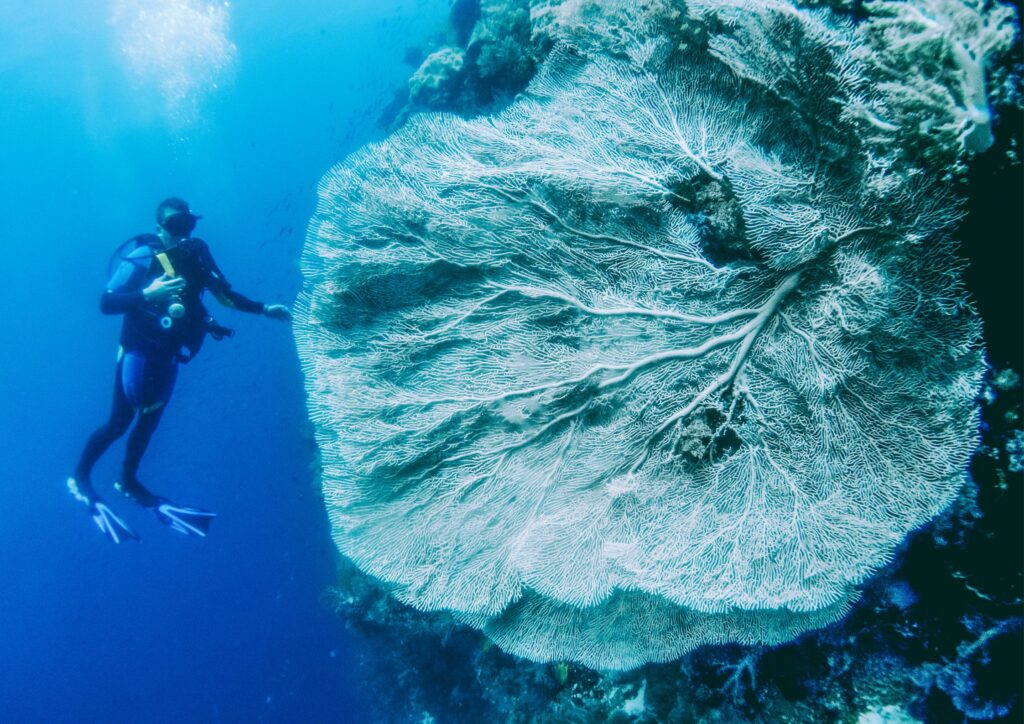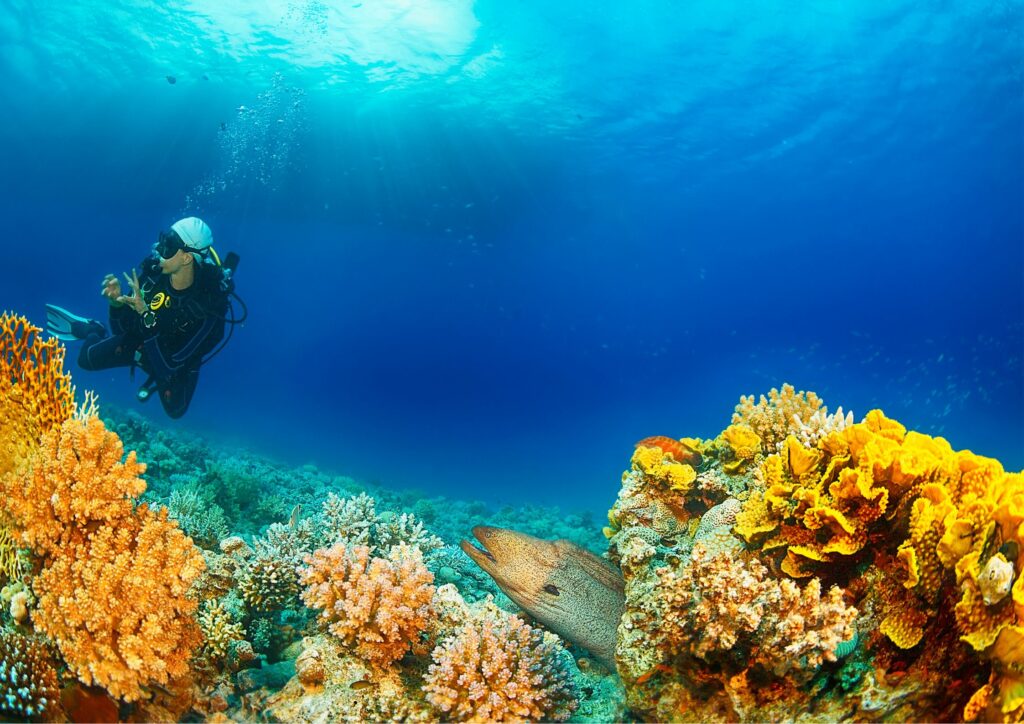Marine Ecosystems, excursion under the sea unveils a vibrant world filled with life and color – an enchanting view offered primarily by the globe’s coral reefs. However, in these uncertain times of climate change and ocean warming, the health and survival of coral reefs hang in balance. This post investigates the coral bleaching effects, details the climate change implications on marine ecosystems, and highlights the importance of protecting these magnificent undersea gardens.
Diving into the Coral Bleaching Dilemma
Coral bleaching brought about by climate change has raised alarm bells worldwide, with scuba divers, who frequently marvel at the beauty of these underwater ecosystems, taking particular notice. This occurrence, predominantly ignited by the rise of water temperature, prompts corals to cast out the algae residing in their tissues. This expulsion culminates in a state of near-albinism, or ‘bleaching’, which drains the vibrant hues that make the coral reefs visually mesmerizing. More than being just a matter of beauty, the loss of algae deprives the corals of a major energy source and weakens the overall health of coral polyps, hence, compromising the corals’ role as lush, thriving habitats and reliable food sources to myriads of marine species.
Ocean Warming Impacts: A Deeper Look
Another grim catastrophe of climate change comes in the form of ocean warming, which poses a remarkable risk to not just the fate of corals but the general equilibrium of marine ecosystems. Escalating sea temperatures aid the proliferation of calamitous weather scenarios such as cyclones and hurricanes that can wreak enormous havoc on coral reefs. The continued exposure of corals to these warmer conditions pressures them past their normal heat tolerance. This heat stress could subsequently provoke mass bleaching across wide colonies of corals, leading to potential large-scale coral deaths, a fate that we desperately need to circumvent.
Marine Ecosystems Coral Reef Conservation Challenges

The quest to preserve these underwater edens, often termed as ‘rainforests of the sea’, is confronted with a slew of arduous challenges. These hurdles include but are not limited to developing strategies to counteract coral bleaching consequences, instilling ethical fishing norms, and battling broader problems such as controlling world greenhouse gas emissions. The magnitude of these tasks necessitate a unified global effort, considering that the vitality of coral reefs extend beyond their impact on divers. Indeed, they are significant to billions of people who depend on them for food, storm surge protection, income and a plethora of other crucial ecosystem services.
Protecting the Coral Reefs: A Shared Responsibility
The enormous undertaking of securing and revitalizing our coral reefs is a responsibility that must be shared by all. Although global interventions aimed at climate change mitigation and biodiversity conservation are being rolled out, it’s crucial to acknowledge that we, as individuals, hold a key part in this task. Environmental stewardship in the form of conscious consumerism, minimizing our carbon imprint, and championing sustainable practices within our local communities, when pooled together, can culminate in a considerable, lasting effect on the preservation of these magnificent marine ecosystems.
The Future Below Waves of Marine Ecosystems: Climate Change, Coral Reefs, and the Divers’ Role
The threats posed by climate change and ocean warming on coral reefs and marine ecosystems are dire and imminent. Our visits to the underwater world as divers, marine enthusiasts, or researchers could be marred by colorless corals and less diverse marine life if decisive action isn’t taken. From understanding the gravity of coral bleaching effects to actively participating in conservation measures, the monumental task of protecting our coral reefs insists on a unified effort. It’s no longer about individual interests, but the future of our divers, the marine ecosystem, and above all, our planet.

I’m amazed by the vivid descriptions of coral reefs in this article. It’s heartbreaking to think about the consequences of climate change on these ecosystems. We must work together to mitigate its effects and preserve the beauty of our oceans.
Dear Lynette, we couldn’t agree more with your sentiments on the importance of preserving our coral reefs. At Gill Divers, we strive to not only provide an unforgettable diving experience but also educate our customers about the significance of these underwater ecosystems. Climate change is a pressing issue that requires collective action from governments, organizations, and individuals like you. We appreciate your enthusiasm and hope you will consider joining us in our mission to protect marine life. If you have any questions or concerns, please don’t hesitate to contact us at +65 6734 9373 or [email protected].
I’ve always been fascinated by coral reefs and their importance to marine ecosystems. It’s alarming to see the impact of climate change on these underwater wonders. We need to take immediate action to protect them for future generations.
Kavitha, thank you for sharing your concerns about coral reefs and their importance to marine ecosystems. We couldn’t agree more that climate change poses a significant threat to these underwater wonders. At Gill Divers, we believe that education and awareness are crucial steps in protecting our coral reefs. We encourage all divers to adopt responsible and sustainable practices when exploring the ocean, such as not touching or damaging coral formations, and choosing eco-friendly diving operators. Additionally, supporting organizations dedicated to marine conservation efforts can make a tangible difference. If you’re interested in learning more about how you can contribute to coral reef conservation, please don’t hesitate to reach out to us at Tel: +65 6734 9373 or Email: [email protected]. We’re always happy to provide guidance and support. Best regards, Gill Divers.
This article highlights the urgent need for climate action. As divers, we have a unique perspective on the beauty and fragility of coral reefs. It’s our responsibility to spread awareness about the importance of protecting these ecosystems.
Thank you for sharing your thoughts on the urgent need for climate action to protect our coral reefs, Razlan. As divers, we indeed have a unique perspective on the beauty and fragility of these ecosystems. It’s heartening to see individuals like yourself taking responsibility in spreading awareness about their importance. At Gill Divers, we’re committed to not only providing exceptional diving experiences but also promoting attitudes of better respect and appreciation for the ocean and its life. We believe that by working together, we can make a difference. If you’d like to learn more about our conservation efforts or would like to get involved, please don’t hesitate to contact us at Tel: +65 6734 9373 or Email: [email protected].